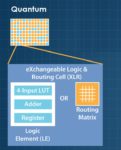When I worked at EDA vendors and attended DAC, one of the most popular questions asked in the booth and suites was simply, “What’s new this year?” It’s a fair question, and yet many semiconductor professionals are so focused on their present project, using their familiar methodology, that they simply… Read More
CXL Verification. A Siemens EDA Perspective
Amid the alphabet soup of inter-die/chip coherent access protocols, CXL is gaining a lot of traction. Originally proposed by Intel for cross-board and cross-backplane connectivity to accelerators of various types (GPU, AI, warm storage, etc.), a who’s who of systems and chip companies now sits on the board, joined by an equally… Read More
A Fresh Look at HLS Value
I’ve written several articles on High-Level Synthesis (HLS), designing in C, C++ or SystemC, then synthesizing to RTL. There is unquestionable appeal to the concept. A higher level of abstraction enables a function to be described in less lines of code (LOC). Which immediately offers higher productivity and implies less bugs… Read More
HLS in a Stanford Edge ML Accelerator Design
I wrote recently about Siemens EDA’s philosophy on designing quality in from the outset, rather than trying to verify it in. The first step is moving up the level of abstraction for design. They mentioned the advantages of HLS in this respect and I refined that to “for DSP-centric applications”. A Stanford group recently presented… Read More
Standardization of Chiplet Models for Heterogeneous Integration
The emergence of 2.5D packaging technology for heterogeneous die integration offers significant benefits to system architects. Functional units may be implemented using discrete die – aka “chiplets” – which may be fabricated in different process nodes. The power, performance, and cost for each unit may be optimized separately.… Read More
RISC-V embedded software gets teams coding faster
RISC-V processor IP is abundant. Open-source code for RISC-V is also widely available, but typically project-based code solves one specific problem. Using only pieces of code, it’s often up to a development team integrate a complete application-ready stack for creating an embedded device. A commercial embedded software development… Read More
Using EM/IR Analysis for Efinix FPGAs
I’ve been following the EM/IR (Electro-Migration, IR is current and resistance) analysis market for many years now, and recently attended a presentation from Steven Chin, Sr. Director IC Engineering of Efinix, at the User2User event organized by Siemens EDA. The Tuesday presentation was in the morning at the Marriott… Read More
Methods for Current Density and Point-to-point Resistance Calculations
IC reliability is an issue that circuit design engineers and reliability engineers are concerned about, because physical effects like high Current Density (CD) in interconnect layers, or high point-to-point (P2P) resistance on device interconnect can impact reliability, timing or Electrostatic Discharge (ESD) robustness.… Read More
3D IC Update from User2User
Our smart phones, tablets, laptops and desktops are the most common consumer products with advanced 2.5D and 3D IC packaging techniques. I love seeing the product tear down articles to learn how advanced packaging techniques are being used, so at the User2User conference in Santa Clara I attended a presentation from Tarek Ramadan,… Read More
Joseph Sawicki of Siemens EDA at User2User
I attended the annual user group meeting called User2User in Santa Clara this year, hosted by Siemens EDA, with 51 presentations by customers in 11 tracks, and keynotes during each lunch hour from semiconductor executives. Joseph Sawicki, Executive VP, IC Segment, at Siemens EDA presented on a Tuesday, along with Prashant Varshney,… Read More









